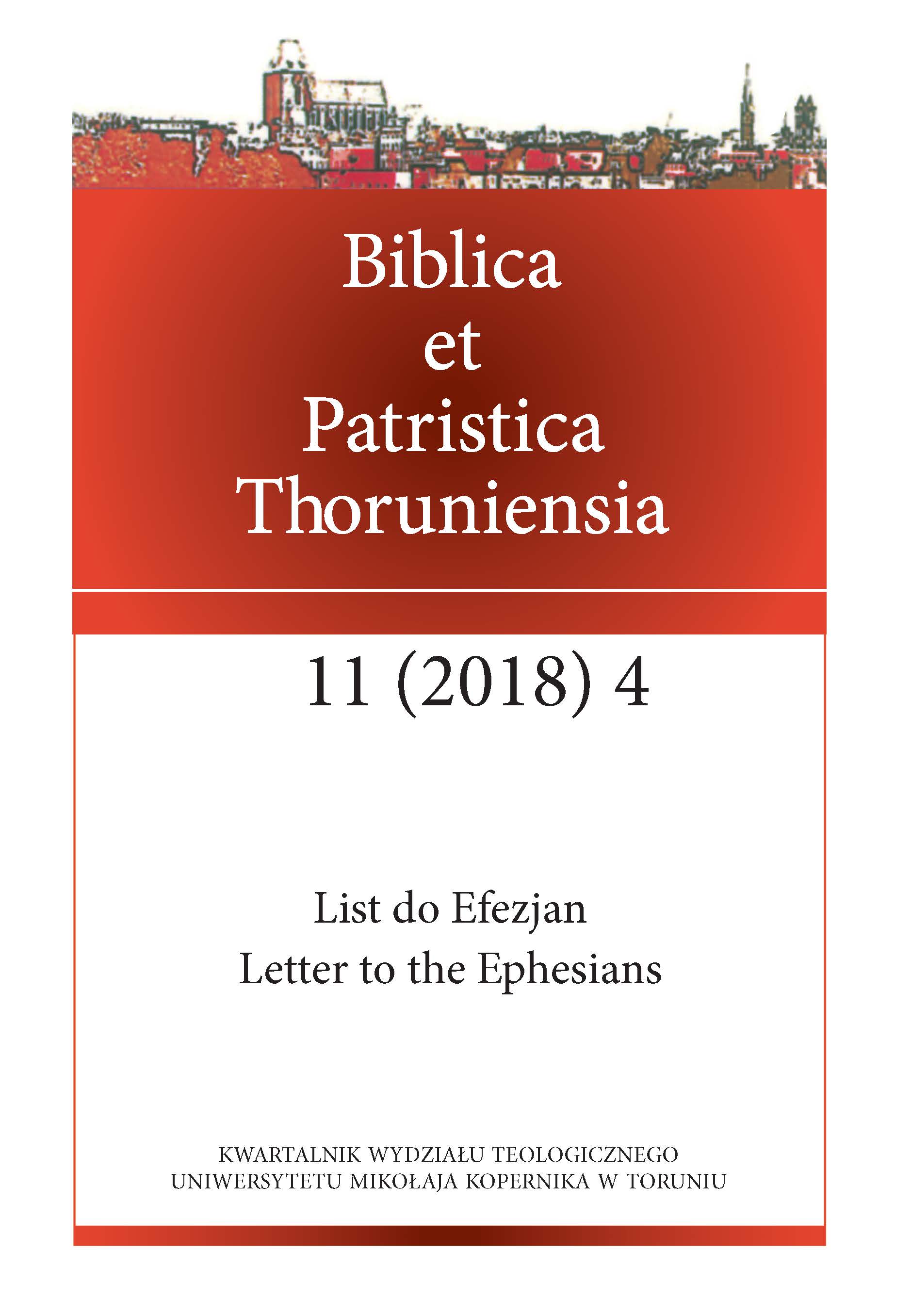The formation of gentile Christ-believing identity vis-à-vis Israel in Ephesians and Barnabas
DOI:
https://doi.org/10.12775/BPTh.2018.019Keywords
Ephesians, Barnabas, Israel, replacement theology, collective memory, ethnic identityAbstract
Ephesians is frequently located at a mid-point on a trajectory in early Christianity between Paul’s earlier struggles to forge unity between Jewish and gentile Christ-believers and later replacement theologies. The author of the present article tests this trajectory through a comparative analysis of Ephesians and Barnabas, investigating the way in which the two epistles respectively shape a collective memory for their recipients with respect to Israel, its Scriptures and its symbols. Examining the two epistles from this perspective highlights their differences strikingly, calling into question the posited trajectory. In this respect, Ephesians is generally consonant with the undisputed Pauline epistles.References
Barth, M., Ephesians, Garden City NY 1974.
Best, E., Ephesians, London 1998.
Bruce, F.F., The Epistles to the Colossians, to Philemon and to the Ephesians, Grand Rapids MI 1984.
Campbell, W. S., Unity and Diversity in the Church: Transformed Identities and the Peace of Christ in Ephesians, Transformation 25/1 (2008), pp. 15–31. DOI: https://doi.org/10.1177/026537880802500102
Dunning, B.H., Strangers and Aliens No Longer: Negotiating Identity and Difference in Ephesians 2, Harvard Theological Review 99/1 (2006), pp. 1-16. DOI: https://doi.org/10.1017/S001781600600109X
Ehrman, B.D., The Apostolic Fathers Volume II (Loeb Classical Library 25), Cambridge MA 2003.
Esler, P.F., “Remember My Fetters”: Memorialisation of Paul’s Imprisonment, in: Explaining Christian Origins and Early Judaism: Contributions From Cognitive and Social Science, R. Uro, I. Pyysiäinen, P. Luomanen (eds.), Leiden 2007, pp. 231-58.
Fowl, S.E., Ephesians: A Commentary, Louisville KY 2012.
Gnilka, J., Der Epheserbrief (2nd ed.), Freiburg 1977.
Hakola, R., Social Identities and Group Phenomena in Second Temple Judaism, in: Explaining Christian Origins and Early Judaism: Contributions From Cognitive and Social Science, R. Uro, I. Pyysiäinen, P. Luomanen (eds.), Leiden 2007, pp. 259-276.
Harrill, J.A., Ethnic Fluidity in Ephesians, New Testament Studies 60/3 (2014), pp. 379-402. DOI: https://doi.org/10.1017/S0028688514000046
Hoehner, H.W., Ephesians: An Exegetical Commentary, Grand Rapids MI 2002.
Hvalvik, R., The Struggle for Scripture and Covenant: The Purpose of the Epistle of Barnabas and Jewish-Christian Competition in the Second Century, Tübingen 1996.
Kok, M., The True Covenant People: Ethnic Reasoning in the Epistle of Barnabas, Studies in Religion 40/1 (2011), pp. 81–97. DOI: https://doi.org/10.1177/0008429810377978
Lincoln, A.T., Ephesians, Dallas TX 1990.
Lowy, S., The Confutation of Judaism in the Epistle of Barnabas, Journal of Jewish Studies 11 (1960), pp. 1-33.
MacDonald, M.Y., Colossians and Ephesians, Collegeville MN 2000.
MacDonald, M.Y., The Politics of Identity in Ephesians, Journal for the Study of the New Testament 26/4 (2004), pp. 419-444. DOI: https://doi.org/10.1177/0142064X0402600403
Martin, R.P., Ephesians, Colossians and Philemon, Louisville KY 1991.
Mouton, E. Memory in Search of Dignity?: Construction of Early Christian Identity through Redescribed Traditional Material in the Letter to the Ephesians, Annali Di Storia Dell’esegesi 29/2 (2012), pp. 133-153.
Paget, J.C., The Epistle of Barnabas: Outlook and Background, Tübingen 1994.
Rader, W.H., The Church and Racial Hostility: A History of Interpretation of Ephesians 2:11-22, Tübingen 1978.
Shkul, M., Reading Ephesians: Exploring Social Entrepreneurship in the Text, London 2009.
Stenschke, C., “Once You Were in Darkness”: The Past of the Readers of Ephesians, European Journal of Theology 23/2 (2014), pp. 123-139.
Talbert, C.H., Ephesians and Colossians, Grand Rapids MI 2007.
Windsor, L.J., Reading Ephesians and Colossians After Supersessionism: Christ’s Mission through Israel to the Nations, Eugene OR 2017.
Wright, N.T., Paul and the Faithfulness of God, Minneapolis MN 2013.
Yee, T.-L.N. Jews, Gentiles and Ethnic Reconciliation: Paul’s Jewish Identity and Ephesians, Cambridge 2004.
Downloads
Published
How to Cite
Issue
Section
License
CC BY ND 4.0. The Creator/Contributor is the Licensor, who grants the Licensee a non-exclusive license to use the Work on the fields indicated in the License Agreement.
- The Licensor grants the Licensee a non-exclusive license to use the Work/related rights item specified in § 1 within the following fields: a) recording of Work/related rights item; b) reproduction (multiplication) of Work/related rights item in print and digital technology (e-book, audiobook); c) placing the copies of the multiplied Work/related rights item on the market; d) entering the Work/related rights item to computer memory; e) distribution of the work in electronic version in the open access form on the basis of Creative Commons license (CC BY-ND 3.0) via the digital platform of the Nicolaus Copernicus University Press and file repository of the Nicolaus Copernicus University.
- Usage of the recorded Work by the Licensee within the above fields is not restricted by time, numbers or territory.
- The Licensor grants the license for the Work/related rights item to the Licensee free of charge and for an unspecified period of time.
FULL TEXT License Agreement
Stats
Number of views and downloads: 704
Number of citations: 3



